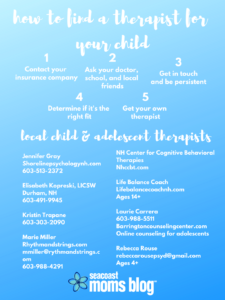It’s daunting. A little frustrating. Totally overwhelming. But, it’s time. For whatever reason, it’s time to find a therapist for your child. Below are five tips for finding the best mental health therapist for your child.
-
Contact your insurance company
Health insurance plans cover mental health care in the same way physical health care is covered. Although some people opt out of using insurance to avoid the hassle, it can be significantly more expensive. If you decide to use insurance benefits to defray the cost of services, you should call member services or log-in to the member portal and get a list of providers in the area who are in-network. An in-network provider will generally cost you less (often the price of an office visit copay) than an out-of-network provider. Don’t waste time contacting providers that aren’t in your network.
-
Ask your pediatrician, school and local friends
Your child’s pediatrician likely has a list of local providers that they can recommend to you. While you’re asking, you should also check with the guidance counselor at your child’s school. The guidance counselor at your child’s school will be able to help you find a counselor that is a good fit for your child. Local friends can also be a valuable resource, so don’t forget to ask your friends if they have any recommendations.
-
Get in touch
Once you have your list of recommended therapists, it’s time to reach out and make contact. It sounds simple, but this is often the most challenging step. Google search all potentials therapists and spend some time browsing their websites. While on their site, write down their phone number and email address. Next, draft an email and use the BCC function to send it to every therapist with an email address. In the email, briefly describe the situation with 1-2 sentences, state your availability (days and times) and provide your insurance information.
This is the most challenging step because, for whatever reason, it’s really hard to get a therapist to call you back before you are an official client. Be precise about what you need and be persistent. When leaving a message, say who referred, why they might be a good fit, insurance info and a time frame that you expect to hear from them (24-48 hours is sufficient).
-
Allow three sessions to determine fit
Now that you’ve heard back from a potential therapist and worked out the insurance and scheduling details, it’s time to actually meet in real life. In the first appointment, take your time to ask all your questions. The therapist should review confidentiality and informed consent (knowing what you are getting into) and may have rating scales or questionnaires for you to complete.
The first appointment can be more business-like and formal than the subsequent appointments. Commit to at least two more sessions; after that, you can move on if you don’t think it’s is a good fit (unless there are ethical concerns, then run!). If after three sessions, the connection and rapport are still lacking, it’s probably time to find someone new (head back to step 3).
-
Consider getting your own therapist
We settled the nature vs. nurture debate years ago (spoiler alert: it’s both). When your kid is struggling, it’s hard to tell where the struggle is coming from. You are responsible for the ‘nurture side of things, even if you can’t do much to be done about the ‘nature’ side of things. That being said, there is a solid chance that your stuff is impacting the way you are parenting your child. By stuff I mean your family of origin, your values, your relationships, your stress level, your expectations, and on and on. You get the point. It’s not all about your kid–if they are struggling, it’s likely that you are struggling too. You may need support (don’t we all). You will gain new strategies and techniques. Or, you might just get a place to vent to an impartial and empathetic person. The good news? Just follow the steps above to get YOURSELF a therapist.

For More Information check out these other resources to find out more about child and adolescent depression and anxiety.










